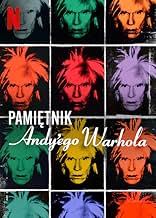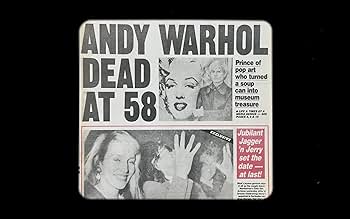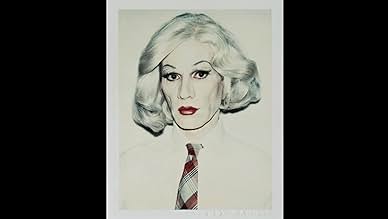ÉVALUATION IMDb
7,7/10
2,9 k
MA NOTE
Après avoir survécu à une tentative d'assassinat en 1968, Andy Warhol documente sa vie et ses sentiments. Cette série révèle les secrets de ses journaux intimes.Après avoir survécu à une tentative d'assassinat en 1968, Andy Warhol documente sa vie et ses sentiments. Cette série révèle les secrets de ses journaux intimes.Après avoir survécu à une tentative d'assassinat en 1968, Andy Warhol documente sa vie et ses sentiments. Cette série révèle les secrets de ses journaux intimes.
- Nommé pour 4 prix Primetime Emmy
- 2 victoires et 9 nominations au total
Parcourir les épisodes
Avis en vedette
This was a binge watch for me as the 70's & 80's was my time in NYC living in an illegal loft before Soho became the in place for the BBQ crowd, I don't mean barbeque. I knew most of the people that hung out with Warhol and Basquiat and met both of them many times during the disco, drugs, drinks era. I spent most of my salary each month buying art from both of them when Basquiat was selling signed drawings on postcards for $25 and Warhol who couldn't give away his Campbell soup can paintings away at the The Odeon, which is celebrating their 42nd anniversary this year. Yes I had great insight at that time of what would be one day and now smile every time I see the prices that both of these artists command at auction. The documentary by Ryan Murphy focuses more on Warhol's lonely life as a closeted gay man looking for love and his obsession with beautiful Waspy men and death. The interviews with his inner circle that are still alive was insightful but as my title says no one will ever know the real Andy Warhol.
I completely enjoyed this documentary series. If you like documentaries you'll like this. If you like Andy Warhol you'll love this. It's informative and layered. I think it's a great binge watch candidate. This series really captures the New York art scene from the late 60's and into the late 80's. It's an entertaining and thoughtful piece focusing on Warhol's rise to fame and all the interesting and artistic characters that entered and left his universe. There was much about Andy Warhol's life and history that I didn't know about and this documentary series covers all the bases. And yet I find myself asking if anyone ever really knew this complex artist. His flaws and insecurities are explored as is his somewhat conflicted love life. Several aspects of this series really resonated with me, which leads me to admit that I may be a tad biased. All who were involved with this work of art should feel proud and should also be applauded for a job well done.
Unless you are or were a hard-core fan of Andy Warhol, you (like most of us) probably have a preconceived notion of who Warhol was. To most people, he was the weird looking guy with the bad wig who painted a bunch of Campbell soup cans. This documentary blows the lid off of any and most perceptions people had of Warhol.
I think for the most part Warhol was his own creation of who he wanted the world to think he was, i.e., eccentric, reclusive, lonely, fly-on-the-wall persona who created an almost completely new genre of modern art. He would used this self-creation to at once achieve what he most wanted (wealth and fame) while simultaneously retreating from the spotlight when it suited his purpose.
This doc peels all of the layers off of the facade. What we see is a man who was at times a social butterfly, one who craved affection just like any other person, one who fell in love and had his heart broken when the love affairs dissolved and partook in everyday activities just like the common man.
To me, two of the most startling things I found out were that Warhol was on 'The Love Boat' and he fell off of the back of a snowmobile. I was literally gob smacked.
As an added bonus, this movie is a must see for anyone who wants to know what NYC was like before, during and after the Aids epidemic. It's devastation is revisited in gut-wrenching fashion.
I highly recommend this series if you have even a passing interest in art and the life of one of the greatest modern painters of a generation.
I think for the most part Warhol was his own creation of who he wanted the world to think he was, i.e., eccentric, reclusive, lonely, fly-on-the-wall persona who created an almost completely new genre of modern art. He would used this self-creation to at once achieve what he most wanted (wealth and fame) while simultaneously retreating from the spotlight when it suited his purpose.
This doc peels all of the layers off of the facade. What we see is a man who was at times a social butterfly, one who craved affection just like any other person, one who fell in love and had his heart broken when the love affairs dissolved and partook in everyday activities just like the common man.
To me, two of the most startling things I found out were that Warhol was on 'The Love Boat' and he fell off of the back of a snowmobile. I was literally gob smacked.
As an added bonus, this movie is a must see for anyone who wants to know what NYC was like before, during and after the Aids epidemic. It's devastation is revisited in gut-wrenching fashion.
I highly recommend this series if you have even a passing interest in art and the life of one of the greatest modern painters of a generation.
Great portrait of Warhol and the world that surrounded him that I'll admit I'd didn't know much about. I'm very glad I got to see this. This film is free of sensation and a very respectful chronology of art and artist's relationship with people and the world.
A class act on all fronts.
First of all, from the credits on in, it looks sumptuous. The use of digital technology is far more aesthetically sophisticated than pretty much anything I'm seeing from Hollywood and shows, like only one or two other films I'm aware of (the neo Giallo 'Amer' is one) that digital at its best can make a vital, valuable contribution to movie imagery. We even get a sort of implicit origin story for all this in a couple of clips of Warhol trying early computer drawing programmes, once with instruction from Steve Jobs. The leap from that to this doc is something like that from kid's drawing to the high Renaissance. Here, the tech is used to seamlessly weave together an extraordinarily rich array of filmed source material available on Warhol with modern-day interviews and give the whole a lushness at least equal to that of film.
The digital finishing touch: with the permission of the Andy Warhol Foundation, Warhol's voice has been computer simulated to read the diaries - and just as the computerised imagery achieves warmth, the voice, the seeming summa of Warhol's stated desire to become a machine, has a surprisingly human quality, its hint of melancholy entirely right for the diaries.
This little irony of Warhol finally becoming a machine but the machine achieving feeling is almost a metaphor for the story being told here, for the likely discovery of what being a machine meant to Warhol as a man. In an almost aggressively gleeful flouting of Barthes' 'Death of the Author,' the doc is primarily about Warhol's personal life, especially his long-term love relationships with men. Excellent as Barthes' argument is in many ways, we might note at this point that he was himself a gay man in a homophobic time, who may have had his own reasons for wanting to keep the author's biography in the shadows.
This is the question being asked here: how much was Warhol's brilliantly constructed artistic persona - machinelike, detached, asexual - born of a need to hide or at least make palatable his homosexuality? As discussed here, this is not a reductive question. It more than allows for the fact that, as all art is artifice, the need to veil certain messages can actually enrich the work, and also for Warhol's work still to be read through other lenses. Nevertheless, given the way the persona played itself out in the work, I think the series makes an incredibly strong argument that this is a question, and an area of his biography, that Warhol scholarship cannot ignore, that the personal likely mattered to the work even in terms of the way it was hidden by the work.
Fortunately, for the filmmakers and the viewers, it also, by its nature, makes for a fascinating, touching human story.
First of all, from the credits on in, it looks sumptuous. The use of digital technology is far more aesthetically sophisticated than pretty much anything I'm seeing from Hollywood and shows, like only one or two other films I'm aware of (the neo Giallo 'Amer' is one) that digital at its best can make a vital, valuable contribution to movie imagery. We even get a sort of implicit origin story for all this in a couple of clips of Warhol trying early computer drawing programmes, once with instruction from Steve Jobs. The leap from that to this doc is something like that from kid's drawing to the high Renaissance. Here, the tech is used to seamlessly weave together an extraordinarily rich array of filmed source material available on Warhol with modern-day interviews and give the whole a lushness at least equal to that of film.
The digital finishing touch: with the permission of the Andy Warhol Foundation, Warhol's voice has been computer simulated to read the diaries - and just as the computerised imagery achieves warmth, the voice, the seeming summa of Warhol's stated desire to become a machine, has a surprisingly human quality, its hint of melancholy entirely right for the diaries.
This little irony of Warhol finally becoming a machine but the machine achieving feeling is almost a metaphor for the story being told here, for the likely discovery of what being a machine meant to Warhol as a man. In an almost aggressively gleeful flouting of Barthes' 'Death of the Author,' the doc is primarily about Warhol's personal life, especially his long-term love relationships with men. Excellent as Barthes' argument is in many ways, we might note at this point that he was himself a gay man in a homophobic time, who may have had his own reasons for wanting to keep the author's biography in the shadows.
This is the question being asked here: how much was Warhol's brilliantly constructed artistic persona - machinelike, detached, asexual - born of a need to hide or at least make palatable his homosexuality? As discussed here, this is not a reductive question. It more than allows for the fact that, as all art is artifice, the need to veil certain messages can actually enrich the work, and also for Warhol's work still to be read through other lenses. Nevertheless, given the way the persona played itself out in the work, I think the series makes an incredibly strong argument that this is a question, and an area of his biography, that Warhol scholarship cannot ignore, that the personal likely mattered to the work even in terms of the way it was hidden by the work.
Fortunately, for the filmmakers and the viewers, it also, by its nature, makes for a fascinating, touching human story.
Le saviez-vous
- AnecdotesA voice cloning technology called "Resemble AI" was used to recreate Andy Warhol's voice. Director Andrew Rossi explained that it stemmed from Warhol's desire to be emotionless like a machine.
Meilleurs choix
Connectez-vous pour évaluer et surveiller les recommandations personnalisées
- How many seasons does The Andy Warhol Diaries have?Propulsé par Alexa
Détails
- Date de sortie
- Pays d’origine
- Sites officiels
- Langue
- Aussi connu sous le nom de
- The Andy Warhol Diaries
- Consultez plus de crédits d'entreprise sur IMDbPro
- Durée1 heure
- Mixage
- Rapport de forme
- 16:9 HD
Contribuer à cette page
Suggérer une modification ou ajouter du contenu manquant






































